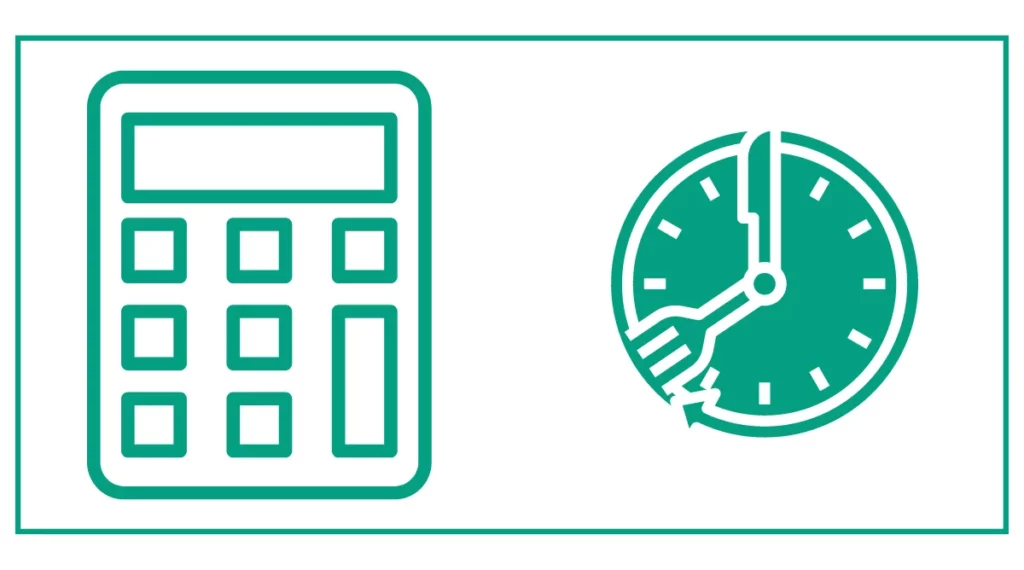Fasting Calculator
This fasting calculator helps you calculate your next meal time considering your last meal and fast duration.
You can enter your last meal time and fast duration in hours to calculate your next fasting meal time.
If you want to go for intermittent fasting, use this IF calculator instead.

You might also want to calculate the calories burned by slow or fast heart rate.
Intermittent fasting has gained popularity as an effective method for weight management and improving overall health. This eating pattern alternates between periods of fasting and eating, focusing on when you eat rather than what you eat. The intermittent fasting calculator is a valuable tool designed to help you plan and track your fasting cycles effectively.
Intermittent fasting offers several potential benefits, including:
- Weight loss
- Improved insulin sensitivity
- Enhanced metabolic health
- Reduced inflammation
- Increased energy and focus
the Intermittent Fasting Calculator
The fast calculator is a user-friendly tool that helps you determine your fasting and eating windows based on your chosen intermittent fasting method. By inputting your last meal time and desired fasting duration, the calculator provides you with the optimal time for your next meal.
How to Use the Intermittent Fasting Calculator
- Enter the time of your last meal in the "Last meal" field.
- Input your desired fasting duration in hours (between 1 and 23).
- Click the "Calculate" button.
- The calculator will display the time for your next meal.
This simple process allows you to plan your fasting cycles effectively and maintain consistency in your intermittent fasting routine.
Popular Intermittent Fasting Methods
There are several intermittent fasting methods to choose from, each with its own fasting and eating windows. The fast calculator can be adapted to work with various fasting schedules. Here are some common approaches:
16/8 Method (Time-Restricted Eating)
This popular method involves fasting for 16 hours and eating during an 8-hour window. For example, you might fast from 8 PM to 12 PM the next day, then eat between 12 PM and 8 PM.
5:2 Diet
With this approach, you eat normally for five days of the week and restrict your calorie intake to 500-600 calories on two non-consecutive days.
Eat-Stop-Eat
This method involves a 24-hour fast once or twice a week. For instance, you might fast from dinner one day to dinner the next day.
Alternate-Day Fasting
Alternate-day fasting involves fasting every other day, either by complete fasting or by significantly reducing calorie intake to 500-600 calories on fasting days.
Calorie Considerations in Intermittent Fasting
While the intermittent fasting calculator focuses on timing, it's important to consider your calorie intake during eating periods. A separate calorie calculator can help you determine the appropriate number of calories to consume based on your age, gender, height, weight, and activity level.
Calorie Intake During Eating Windows
During your eating windows, it's crucial to focus on nutrient-dense foods to ensure you're meeting your nutritional needs. While intermittent fasting doesn't strictly dictate what you eat, maintaining a balanced diet will enhance the benefits of this eating pattern.
Managing Hunger During Fasting Periods
To manage hunger during fasting periods, you can:
- Stay hydrated with water, black coffee, or unsweetened tea
- Keep yourself busy with activities
- Get adequate sleep
- Gradually increase fasting durations to allow your body to adapt
Benefits of Using an Intermittent Fasting Calculator
The intermittent fasting calculator offers several advantages for those practicing this eating pattern:
- Precision: It provides exact timings for your fasting and eating windows, eliminating guesswork.
- Consistency: Helps maintain a regular fasting schedule, which is crucial for success.
- Flexibility: Can be adjusted for various intermittent fasting methods.
- Motivation: Seeing your progress can encourage you to stick to your fasting plan.
- Time Management: Allows you to plan meals and activities around your fasting schedule.
Intermittent Fasting and Metabolic Health
Intermittent fasting may have positive effects on metabolic health. During fasting periods, your body switches from using glucose as its primary energy source to burning stored fat. This metabolic switch can lead to improvements in insulin sensitivity and overall metabolic function.
Impact on Insulin Sensitivity
Intermittent fasting may help improve insulin sensitivity, which is beneficial for managing blood sugar levels and reducing the risk of type 2 diabetes. By giving your body regular breaks from processing food, you allow insulin levels to decrease, potentially enhancing your cells' responsiveness to this hormone.
Effects on Metabolic Rate
Some studies suggest that intermittent fasting might help maintain or even slightly increase metabolic rate, unlike some forms of continuous calorie restriction which can lead to a decrease in metabolism.
Combining Intermittent Fasting with Exercise
The intermittent fasting calculator can also be useful when planning your workout routine. Some people prefer exercising during their fasting period to potentially enhance fat burning, while others feel more energized working out during their eating window.
Fasted Exercise
If you choose to exercise during your fasting period:
- Start with light to moderate intensity workouts
- Listen to your body and stop if you feel dizzy or unwell
- Stay hydrated
- Consider shorter workouts until your body adapts
Exercise During Eating Windows
If you prefer exercising during your eating window:
- Time your meals around your workout for optimal energy
- Ensure adequate protein intake for muscle recovery
- Stay hydrated before, during, and after exercise
Safety Considerations and Precautions
While intermittent fasting can be safe and effective for many people, it's not suitable for everyone. Consult with a healthcare professional before starting any new diet or fasting regimen, especially if you:
- Are pregnant or breastfeeding
- Have a history of eating disorders
- Are underweight
- Have certain medical conditions
- Are taking medications that require food intake
Tips for Success with Intermittent Fasting
To make the most of your intermittent fasting journey and the fast calculator:
- Start gradually: Begin with shorter fasting periods and gradually increase the duration
- Stay hydrated: Drink plenty of water and other non-caloric beverages during fasting periods
- Eat nutrient-dense foods: Focus on whole, unprocessed foods during eating windows
- Be consistent: Use the intermittent fasting calculator to maintain a regular schedule
- Listen to your body: Adjust your fasting plan if you experience negative side effects
- Get enough sleep: Adequate rest can help manage hunger and support overall health
- Plan your meals: Prepare healthy meals in advance to avoid impulsive eating during your eating window
Tracking Progress with the Intermittent Fasting Calculator
The intermittent fasting calculator can be a valuable tool for tracking your progress over time. Consider keeping a log of your fasting cycles, along with notes on your energy levels, weight changes, and overall well-being. This information can help you adjust your fasting plan as needed and stay motivated.
Conclusion
Intermittent fasting, when done correctly, can be an effective approach to weight management and improved health. The intermittent fasting calculator serves as a reliable companion on this journey, helping you maintain consistency and precision in your fasting cycles. Remember that while timing is crucial in intermittent fasting, the quality of your diet during eating periods is equally important.
By combining the structure provided by the fast calculator with a balanced, nutrient-rich diet and regular physical activity, you can maximize the potential benefits of intermittent fasting. As with any significant dietary change, it's essential to listen to your body and consult with healthcare professionals to ensure that intermittent fasting is right for you.
Whether you're new to intermittent fasting or looking to refine your approach, the intermittent fasting calculator is a powerful tool to support your health and wellness goals. Embrace this method with confidence, armed with the precision and guidance that the fast calculator provides.
References
Azizi, F. (2010). Islamic fasting and health. Annals of Nutrition and Metabolism, 56(4), 273-282.
Paoli, A., Tinsley, G., Bianco, A., & Moro, T. (2019). The influence of meal frequency and timing on health in humans: the role of fasting. Nutrients, 11(4), 719.





